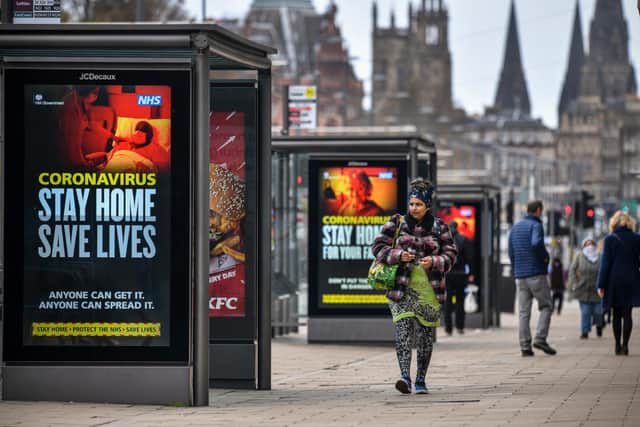Will there be a third wave of Covid in UK? What Boris Johnson said as infections rise across much of Europe
Prime Minister Boris Johnson has warned that the third wave of Covid from European countries will “wash up on our shores”.
Mr Johnson said the UK would “feel effects” of the surging cases in countries throughout the continent.
Advertisement
Hide AdAdvertisement
Hide AdHis comments came after the UK’s national statistician predicted that the country would be hit by a third wave of infections in the autumn.


Sir Ian Diamond, head of the Office for National Statistics (ONS), said he had “no doubt” that a further spike in cases would occur this year, despite the rapid vaccination programme.
So, will there be a third wave of coronavirus in the UK?
Here is everything you need to know.
Will there be a third wave of Covid?
Mr Johnson issued a warning to members of the public amid growing coronavirus infections in Europe.
The Prime Minister told reporters on 22 March that a “third wave” was under way in the continent.
"People in this country should be under no illusions that previous experience has taught us that when a wave hits our friends, I'm afraid it washes up on our shores as well,” he said.
Mr Johnson added: "I expect we will feel those effects in due course. That's why we're getting on with our vaccination programme as fast as we can.”
Last week, Sir Ian said that although the UK’s case rates were the lowest since September, they were still a lot higher than summer 2020 when the first lockdown measures were lifted.
Speaking to The Andrew Marr show, the ONS chief warned the public that they “need to recognise that this is a virus that isn’t going to go away”, despite the impact of the vaccine rollout.
Advertisement
Hide AdAdvertisement
Hide AdHe said while he was confident that the jabs programme was “really starting to provide some real protection”, he had “no doubt that in the autumn there will be a further wave of infections”.
The national statistician said there was also a lot of regional variation in terms of the number of people that have antibodies, which should be taken into account.
“There is a lot of regional variation, so we find 30 per cent of London have antibodies whereas only 16 per cent in the South West, so we need to recognise that as well,” Sir Ian said.
What did Prof Chris Whitty say?
The leading statistician’s comments came after England’s chief medical officer told MPs that he expected coronavirus cases to surge again in the UK this year.
Modelling data considered by the Scientific Advisory Group for Emergencies (Sage) has
suggested that at least a further 30,000 deaths from coronavirus could occur in the UK.
Speaking about the modelling on 9 March, Professor Chris Whitty said: “What we are going to see is, as things are opening up, what all the modelling suggests is that at some point we will get a surge in virus.
“We hope it doesn’t happen soon, it might for example happen later in the summer if we open up gradually or because of the seasonal effect it might happen over the next autumn and winter.
Advertisement
Hide AdAdvertisement
Hide Ad“All the modelling suggests there is going to be a further surge and that will find the people who either have not been vaccinated or where the vaccine has not worked.
“Some of them will end up in hospital and sadly some of them will go on to die.”
He also highlighted the risks when it comes to reopening society too quickly after the latest lockdown.
Is there a third wave in Europe?
Some European countries are currently facing a third wave of Covid infections.
The infection rate in the EU has risen to the highest level since the beginning of February.
New variants of the virus have been blamed for much of the recent increase in countries such as Italy, France and Germany.
Several places are have imposed strict new restrictions to halt the spread.
In Italy, there will be a total nationwide lockdown from 3 to 5 April over Easter.
Advertisement
Hide AdAdvertisement
Hide AdMore than half the country, including Milan and Rome, is already under tight rules imposed on 15 March.
Bars and restaurants closed, along with schools.
Prime Minister Mario Draghi said: “More than a year after the start of the health emergency, we are unfortunately facing a new wave of infections.
“The memory of what happened last spring is vivid, and we will do everything to prevent it from happening again.”
It is a similar situation in France, where rising case numbers and a slow vaccine rollout have led to authorities re-imposing lockdown measures in 16 areas, including Paris.
Non-essential shops have closed while inter-regional travel is prohibited, and the measures will be in place for at least four weeks.
And in Germany, Chancellor Angela Merkel has warned that she may need to apply an “emergency brake” on relaxing restrictions as infections continued to rise.
Lockdown measures will be introduced in regions where the number of weekly cases is above 100 per 100,000 residents.
In Greece, schools will remain closed until the end of the month, along with non-essential shops in places with high infection rates.